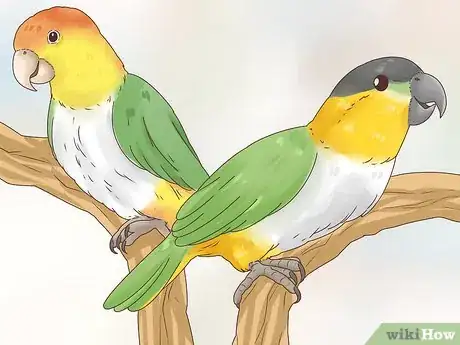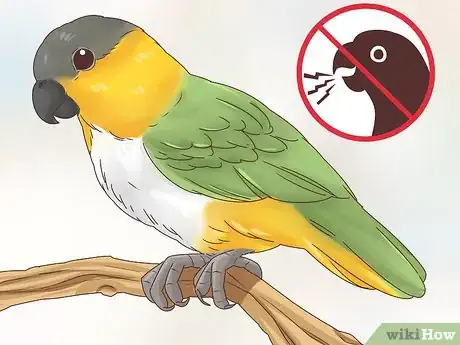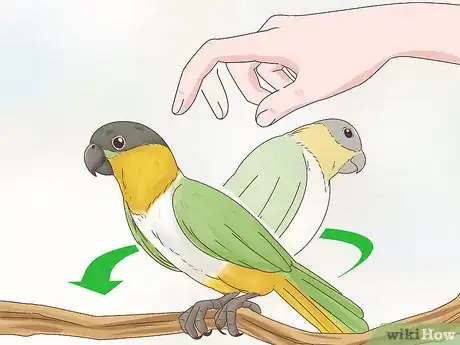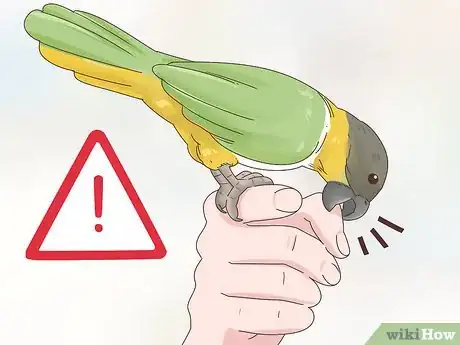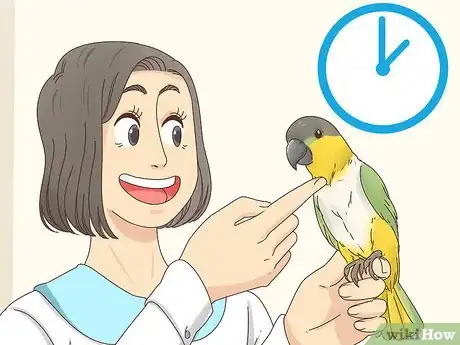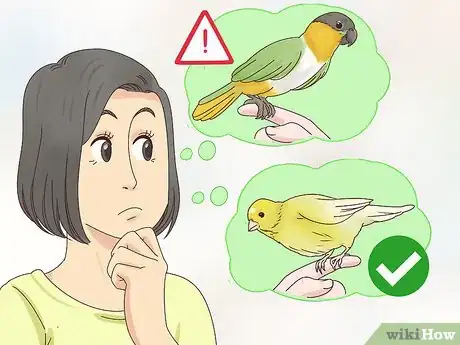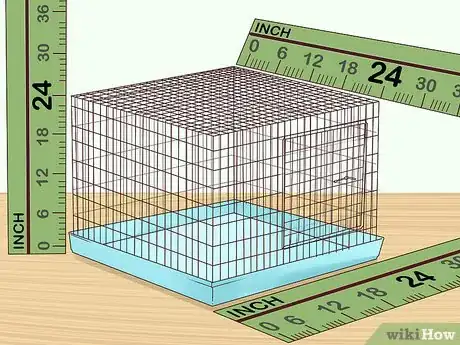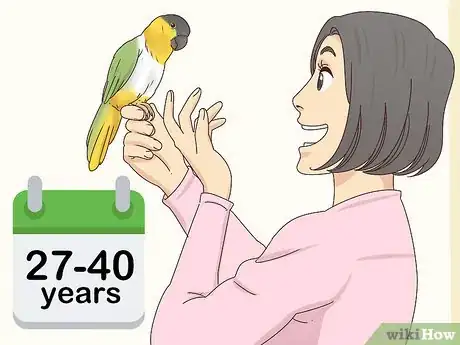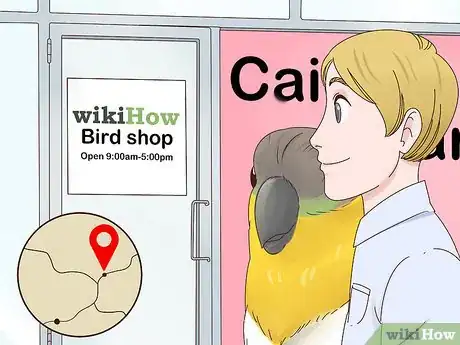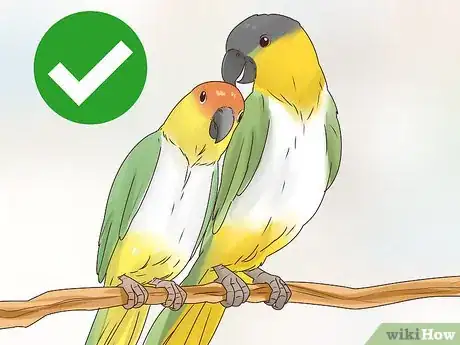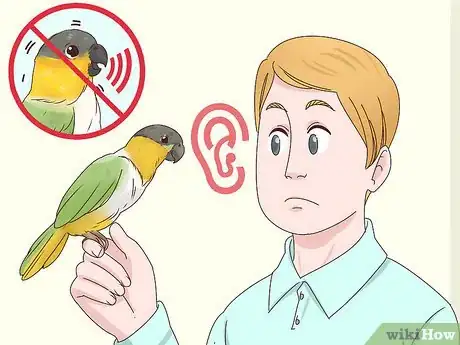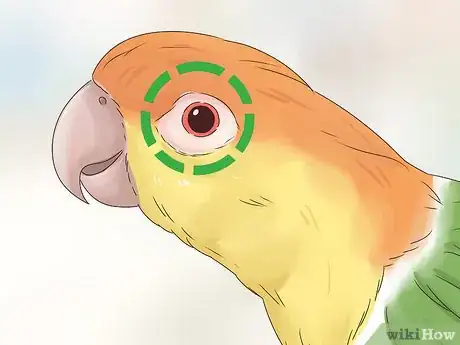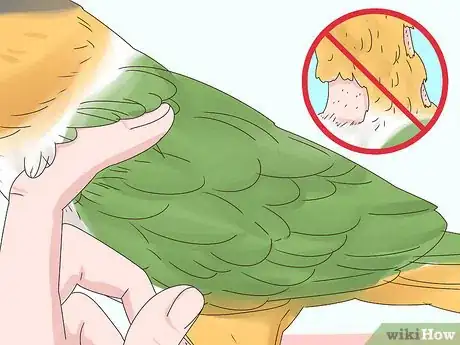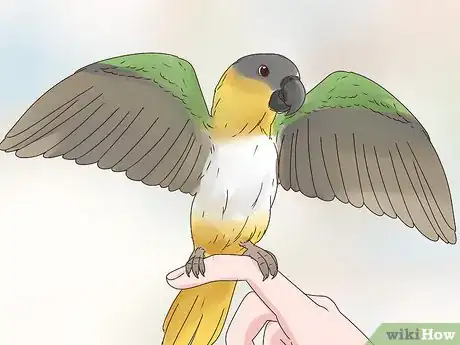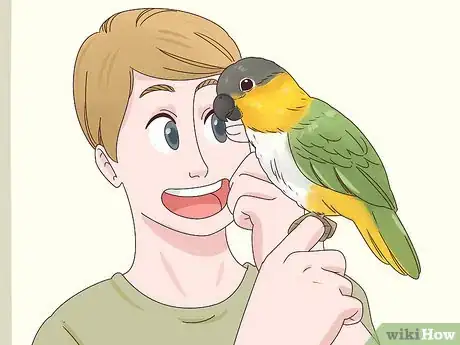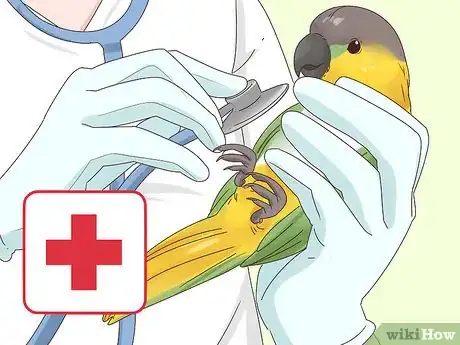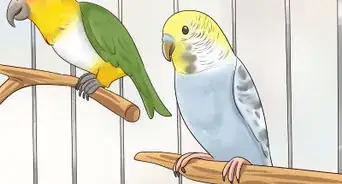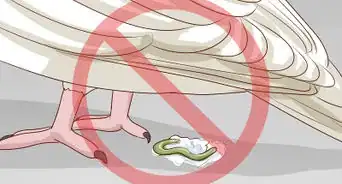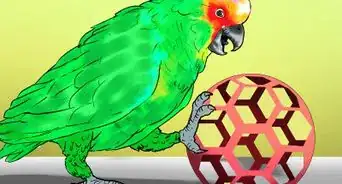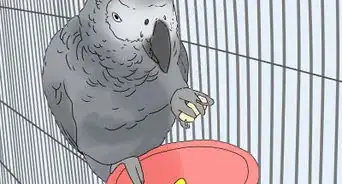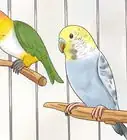This article was co-authored by Pippa Elliott, MRCVS. Dr. Elliott, BVMS, MRCVS is a veterinarian with over 30 years of experience in veterinary surgery and companion animal practice. She graduated from the University of Glasgow in 1987 with a degree in veterinary medicine and surgery. She has worked at the same animal clinic in her hometown for over 20 years.
This article has been viewed 14,736 times.
The caique parrot (pronounced “kai-eke”) is a favorite among bird lovers. These playful clowns are beautiful and personable, but they need to be properly trained and they require a great deal of attention. By learning about caique characteristics and considering your personal lifestyle, you can decide if a caique parrot is right for you. If you do decide to get a caique parrot, be certain to observe it for signs of health before you bring it home.
Steps
Appreciating Caique Characteristics
-
1Appreciate bright colors. Both species of pet caique parrots—the white-bellied caique and the black-headed caique—are known for their vivid, beautiful colors. If you are drawn to visually stunning birds, you might enjoy having a caique parrot around.[1]
-
2Expect less speech from your bird. Parrots are well known for their ability to mimic human speech patterns. As far as parrots go, caiques are not quite as talkative. If teaching your parrot to speak is a high priority for you, you might prefer an African grey or quaker parrot.[2]
- Caiques aren't silent birds, however. If you live in close quarters, such as in an apartment building or with roommates, this could be an issue.[3]
Advertisement -
3Enjoy bird tricks. Caique parrots are known as the “clowns” of the parrot family. They love to learn tricks and show off their skills. If you are interested in training your pet bird and performing tricks with them regularly, a caique parrot may be right for you.[4]
-
4See if you like handling the bird. Caique parrots enjoy being held and played with. In fact, it is important for them to have 1–3 hours of out-of-cage time each day. Visit a local breeder or an exotic bird shop and practice handling the birds. If having a bird you can handle and play with sounds fun for you (and you have the free time to do so each day), a caique parrot may be a good choice for you.[5]
- Some caiques are “beaky” meaning they like to peck unless trained not to. Make sure you're okay with this or have time to invest in training your bird.[6]
Considering Your Lifestyle
-
1Determine how much free time you have. Parrots are known to be rather needy birds. They need social interaction daily, they need to spend quality time outside of their cages each day, and (in the case of caique parrots) they need to play. Playing is both physically and mentally stimulating for your parrot, and doing so daily is crucial to their health.[7]
- When you first bring your parrot home, plan to spend a minimum of 2–4 hours per day with your bird.
- After the initial training period, you'll need to spend 1–3 hours per day with your bird.
- If you have more than one parrot, they can keep each other company, and you can get away with spending a bit less time with them.
-
2Calculate your level of experience. Generally speaking, caiques are not the best choice for someone with little to no bird experience. These birds require guidance, boundaries, and training. If you have a bit of bird experience under your belt, you might be ready to handle a caique.[8]
- If you are a first-time bird owner, you might begin with a canary, finch, or parakeet.
-
3Factor in your budget. Parrots are considered exotic birds, and as such, can be quite expensive. In addition to the initial cost of purchasing the bird, you'll pay a bit more each year for food and routine veterinary care. Think carefully about whether or not you can afford a caique parrot before you pursue buying one.[9] Some general costs include:
- A caique parrot can cost anywhere from $700 to $1500.
- Veterinary care and lab tests can range from $100 to $200 per year (or more in the case of serious illness or emergency).
- Food can range from $100 to $250 per year.
- Additional expenses (like cage, toys, other supplies) can cost anywhere from $50 to $500.
-
4Measure the amount of space in your home. Caique parrots are extremely active birds, and because of this, they need a lot of space to move around. Caiques also enjoy a lot of toys, so you'll need cage-space to accommodate these. The larger the cage you can provide, the happier your bird will be.
- The minimum size cage for one caique is 24 X 24 X 24 inches (60 X 60 X 60 cm), but bigger is always better. A large aviary with plenty of room to fly is ideal.
-
5Prepare to make a long-term commitment. Caique parrots can live for a very long time. In captivity, most caiques live anywhere from 27 to 40 years. In short, you will be sharing you life with your caique parrot for quite a while. If you're ready to make this kind of long-term commitment, you might be ready to own a caique parrot.[10]
Choosing the Right Caique Parrot
-
1Locate a caique to buy. Caique parrots are considered exotic birds, and may not be available at your local pet store. Find a specialty pet store that carries exotic birds, or a store that carries exclusively birds, and you are more likely to find a caique parrot for sale.[11] You might also try:
- Local bird clubs
- Local bird organizations
- Bird farms/breeders in your area
- Classified ads (especially in bird magazines)
-
2Ensure that the bird has been weaned. Never purchase an unweaned bird. Young caiques need this important time with their mother, both for nourishment and socialization. If purchasing a baby caique, find out how long it has been weaned.[12]
- Inquire about the diet the bird has been weaned onto. The greater the variety of foods, the better.
-
3Make sure the bird is breathing well. Once you locate a bird to buy, you'll want to make sure the bird is in good health. Listen to how to the bird is breathing. They should not be wheezing, making clicking noises, or straining for breath.[13]
-
4Look for clear, clean eyes. Cloudy, gooey, or mucky eyes can signal health problems in caique parrots. Take a close look at the parrot's eyes and ensure that they are clean and clear.[14]
-
5Check the feathers. Ruffled or missing feathers are another signal of potential health problems in caique parrots. Make sure that the parrot's feathers are glossy and smooth. They should not be ruffled, and there should be no bare spots.[15]
-
6Make sure the parrot is alert. Caique parrots are friendly, energetic birds. If the parrot seems weak, lethargic, or totally uninterested in interaction there may be a health problem present. Select a bird that seems alert and aware.[16]
-
7Spend as much time with the bird as you can. Before purchasing a caique parrot, spend as much time with it as possible. Each bird will have a different personality, and you will connect with some birds more than others. During your visits, be sure to handle the bird and make sure that it likes you.[17]
- This will also help you determine whether or not the bird has been adequately socialized. A socialized caique will be friendly toward people.
-
8Take the bird to a vet. A reputable breeder/retailer will allow you to return the bird if your vet identifies any major health problems. Before you purchase a bird, find out about the return policy. After you buy the bird, take it to an avian vet right away.[18]
References
- ↑ http://animal-world.com/encyclo/birds/Caiques/CaiqueFamily.php
- ↑ https://petcentral.chewy.com/top-3-best-talking-parrots/
- ↑ https://lafeber.com/pet-birds/species/caique/
- ↑ http://animal-world.com/encyclo/birds/Caiques/CaiqueFamily.php
- ↑ https://be.chewy.com/the-unique-caique/
- ↑ https://lafeber.com/pet-birds/species/caique/
- ↑ https://be.chewy.com/the-unique-caique/
- ↑ http://animal-world.com/encyclo/birds/information/bird-care.php
- ↑ http://www.petplace.com/article/birds/general/adopting-purchasing-a-bird/what-it-costs-to-own-a-bird
- ↑ https://be.chewy.com/the-unique-caique/
- ↑ http://animal-world.com/encyclo/birds/information/bird-care.php
- ↑ https://be.chewy.com/the-unique-caique/
- ↑ http://animal-world.com/encyclo/birds/information/bird-care.php
- ↑ http://animal-world.com/encyclo/birds/information/bird-care.php
- ↑ http://animal-world.com/encyclo/birds/information/bird-care.php
- ↑ http://animal-world.com/encyclo/birds/information/bird-care.php
- ↑ http://animal-world.com/encyclo/birds/information/bird-care.php
- ↑ http://animal-world.com/encyclo/birds/information/bird-care.php
About This Article
Before you choose a caique parrot, first decide if this type of bird will match what you’re looking for in a pet. For example, caiques are not very talkative birds, so if you want a bird that talks more, consider getting an African grey or quaker parrot. Although they aren’t big talkers, caiques are show-offs and love performing tricks, so choose a caique if you’re interested in training it. Remember that caique parrots need a lot of social interaction, so make sure you have at least 2-4 hours to spend with your bird each day. You should also consider that caiques can live between 27 and 40 years, so ensure you’re ready for a long-term pet before adopting. To learn how to choose a healthy caique parrot, read more from our Veterinary co-author!
